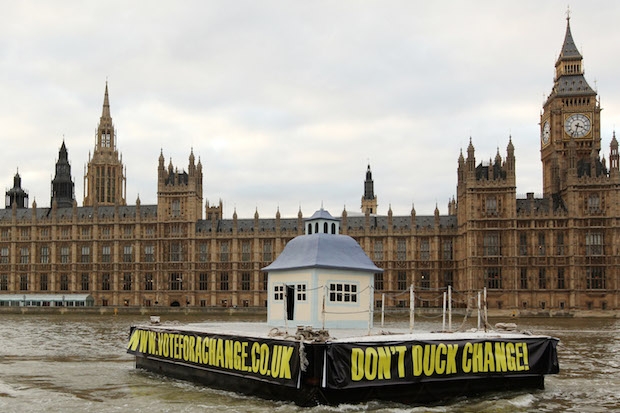Anger is a bad counsellor. A lot of voters are angry with MPs and want to punish them. They believe that during the recent economic crisis, many MPs had only one priority: to fatten their expenses claims. Such voters have only one complaint about the proposed recall bill. They would like it to be tougher.
All this is unfair, inaccurate and damaging. The vast majority of MPs – in all parties – are dedicated and diligent. They came into politics to do good. At least on the Tory side, many of them are making financial sacrifices in order to stay in Parliament. MPs are not well-paid.
Moreover, if your conditions of employment require you to live in two places, one of which is London, a £2000 per month subsidy is hardly excessive. It is true that over the years, the arrangements had grown lax – because successive governments had ducked the question of MPs’ pay, and the allowances had come to be regarded as a form of concealed remuneration. But the extent of corruption and criminality has been grotesquely exaggerated. In the old days, the fees office may have been slack. Now MPs can find themselves treated like Bob Cratchit being interrogated by Scrooge over a farthing’s deficiency in the day’s ledger.
That is the background to the recall question. Of itself, the measure is not that damaging, or that significant. It would be very hard for an MP to find himself recalled. But it will have undesirable consequences, because it will further undermine the public’s respect for Parliament and, therefore, for our democratic system.
Democracy is a difficult concept. One can understand why Churchill said that it was the worst form of government, apart from all the others. In Isaiah Berlin’s words, “the great goods cannot always live together”. We British appear to be wedded to a pair of especially contrarian great goods. We want democracy. We also want strong government. The compromise is an arrangement that can turn electoral pluralities into comfortable Commons’ majorities, and which often enables governments to ignore opinion polls and defy public opinion. But it usually produces strong government.
There is a second great contradiction. If asked, most voters would prefer an MP who was independent-minded and who would refuse to truckle to the Whips. But most thoughtful voters are aware that government is a team game. Unless most of the players did what the captain told them for most of the time, the legislative programme would collapse and there would be no prospect of strong government.
There is no final answer to these problems. The best that we can hope for is a compromise, stronger in practice than in theory. “Out of the crooked timber of humanity, nothing straight is ever made”. Better a durable compromise than an attempt to reconstruct our system on abstract principles. We must not forget that by European standards, the UK has not been badly governed.
Equally, the British would prefer to respect their system of government. The Mother of Parliaments et al is not just sentimentality. If the public came to despise the law-makers, they might move on to despising the laws. The hope would be that as the expenses scandal receded while the economy continued to grow, MPs’ would gradually regain public confidence. A recall Bill will do nothing to encourage that. We must resist cheap populist gestures aimed at appeasing those who delight in the idea of despising MPs. If they have their way, the day will come when those who are not despicable will refuse to stand.






Comments